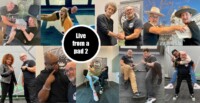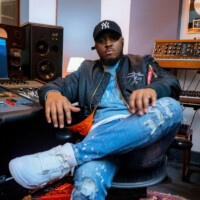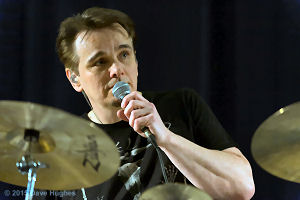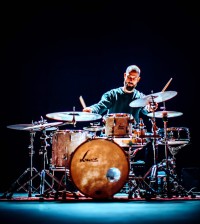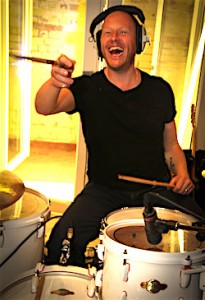 Another name for the list of ‘UK’s hardest working drummers’ is Steve ‘Smiley’ Barnard. Besides having a busy touring and recording schedule he also works as a songwriter, producer and runs his own ‘Sunshine Corner Studio’.
Another name for the list of ‘UK’s hardest working drummers’ is Steve ‘Smiley’ Barnard. Besides having a busy touring and recording schedule he also works as a songwriter, producer and runs his own ‘Sunshine Corner Studio’.
After having been the first live drummer for Robbie Williams solo career, Smiley’s career exploded and got him to tour and record with countless artists such as Joe Strummer, The Alarm, The Mock Turtles, Hard-Fi, Bad Company, Tracey Ullman and Newton Fawkner (just to name a few). UK trip hop outfit Archive have trusted in Barnard’s grooves for 13 years now and still remain his main project to date.
I visited Smiley at his studio outside of London to chat about his work as a drummer, his passion for producing and the new Smileys friends album.
First things first: Why the nickname Smiley?
I really need to get a showbiz answer to that. It was something simple. Around 25 years ago when there was a lot of us in a certain music scene and somebody was trying to describe me to somebody else and went: “You know Steve; Drummer Steve; Smiley Steve; the guys who’s always smiling!” And the nickname kind of stuck. I thought it’s not a bad nickname and people might remember it a bit more than just a normal name.
Also my name is Steve Barnard and there is another drummer called Steve Barney who plays for Anastacia, so I thought it’s best to keep it different so I stuck with it.
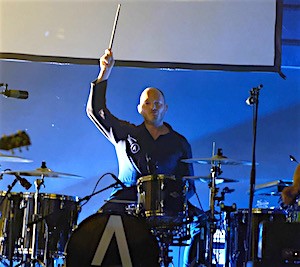 You started playing in your highchair. Where did it go from there?
You started playing in your highchair. Where did it go from there?
I was always playing drums as a kid and then in my early teens I remember doing a school play and the guest was Roy Castle. I don’t know if you remember him, he was an incredible British entertainer and TV star. He was doing the play and I was playing the drums. After the show my dad started talking to him and said: I have this 12 year-old boy, what am I gonna do with him? Roy Castle told him to take me out of my comfort zone, so my Dad took me to this jazz drummer called John Taylor for some lessons. Having to play jazz I learned how to play swing, from swing I learned to groove, that of course amalgamated into a pop and rock thing and kind of formed my later drumming style.
It was the best thing I ever did and I owe my Dad for that.
Was there a conscious decision to go pro or did you just slip into it?
There was a moment in my early 20s when I was doing a couple of bits here and there and still doing odd jobs. One day I got a call to play with a pub band on a Friday and the drummer asked me to come and see them play on the Wednesday to get an idea for the gig. It was a friend of mine, Simon, who’s still my best friend now. I got chatting to him and he was playing seven nights a week for ten different bands and he was earning a living playing drums. I just thought: if he’s doing that, I should be doing that! Luck has it that he was just about to go to University to be a teacher so I kind of took over all his gigs. Within a month or so I was in ten/twelve bands working seven nights a week. I did a good 300 shows a year for a few years. That’s where I learned all my chops. It’s all down to Simon.
You once said that one of the best things you did for your career was to play lots of functions. Nowadays it sometimes feels a bit like a frowned upon thing to do amongst younger players.
I totally disagree with this. Whenever I get asked by a parent now: “I’ve got this 16/17 year old kid leaving school and they wanna go to music college – what advice do you have?”. A couple of bits of advice are: One, there is no money in it. Brace yourself because unless you write a hit, you’re not gonna earn a massive amount of money – but it is the coolest job in the world.
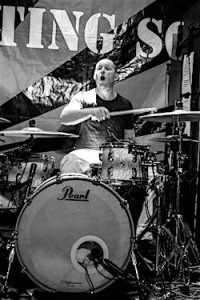 Advice two is get into a covers/function band. What you’re doing there is playing 30 or 40 different styles of drumming every single night. What I did, rather than it being this mundane playing night in night out kind of thing, I tried to be the drummer in that band for ever single song. So if Steely Dan came on I tried to be Jeff Porcaro; if Led Zeppelin came on I was John Bonham; then Keith Moon, then Ringo and so on. I tried to take a bit of all of them, so after a few years I had all their chops in my pocket. When it came to going out and doing sessions for people, if someone for example put a Beatles kind of track on, you know exactly how to play that. I think it’s invaluable and I would never look down on it. I would look up on it cause you’re earning money from playing drums.
Advice two is get into a covers/function band. What you’re doing there is playing 30 or 40 different styles of drumming every single night. What I did, rather than it being this mundane playing night in night out kind of thing, I tried to be the drummer in that band for ever single song. So if Steely Dan came on I tried to be Jeff Porcaro; if Led Zeppelin came on I was John Bonham; then Keith Moon, then Ringo and so on. I tried to take a bit of all of them, so after a few years I had all their chops in my pocket. When it came to going out and doing sessions for people, if someone for example put a Beatles kind of track on, you know exactly how to play that. I think it’s invaluable and I would never look down on it. I would look up on it cause you’re earning money from playing drums.
Even the biggest players still do it. Look at Jeremy Stacey – he’s out playing with the biggest names and the next day he’s off to play the 606 with a little jazz band, because that’s what his work ethic is. I’m a big fan of that.
First pro gig?
It was a band called ‘The Mock Turtles’ who were a Manchester band who had a huge hit in ’92 with “Can You Dig It”. At that time I was playing in a few function bands at night but during the day I was driving a van. This song came on the radio and I loved it, the best pop song I had ever heard. One Wednesday night I went to play with a blues band in the backroom of a bar in West London and a guy came up to me and went: “You’re impressing some quite important people” and he pointed to the bar. It was the band Mock Turtles who had been on Top Of The Pops the night before (which I watched) and were still in London. I went to say hello. First thing I noticed was that they were still in the same clothes they wore on the telly [laughs].
They said they were thinking about switching drummer and asked if I was interested. Of course I was. It actually took about a year before I got the call but then I went on tour with them straight away and that was my first taste of being in a proper well-known band. It was very cool.
You worked with Robbie Williams at the very start of his solo career. Tell me more about that.
I got called to audition for Robbie and got the gig but he had already recorded the album with Chris Sharrock playing drums. I did some backing vocals on the first record though.
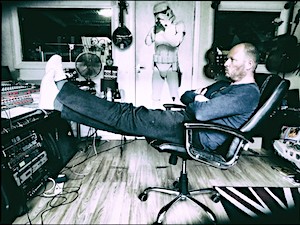 I then did all the promo to the album, did two tours and recorded all the B-sides for the singles. So the B-sides to Angels and Let Me Entertain You and all those hits. After that I even recorded all the demos for the next album: songs like Millennium, Strong, No Regrets and so on. Just as it was all flying through the roof Chris Sharrock’s contract with ‘World Party’ came to an end and you can work the rest out…
I then did all the promo to the album, did two tours and recorded all the B-sides for the singles. So the B-sides to Angels and Let Me Entertain You and all those hits. After that I even recorded all the demos for the next album: songs like Millennium, Strong, No Regrets and so on. Just as it was all flying through the roof Chris Sharrock’s contract with ‘World Party’ came to an end and you can work the rest out…
How was working with him when you look back at it now. Did you think it would ever kick off like it did?
It was amusing at the time because they weren’t sure if it was actually gonna take. Angels was the fourth single of the album and up till then it went downhill and there was a real “will he lose his deal”-vibe about it. We all knew that he had this song and that it would come out around Christmas time. He was just sitting on this goldmine and suddenly it all kicked off. I remember doing it on Top Of The Pops and just thinking this is a bit of history cause this is one of the greatest songs ever, and I’m playing it. Whenever they show that Top Of The Pops, it’s me playing, that’s amazing!
I’m a massive fan and I love him as a man. I also really respect him as a musician, I don’t think he gets enough credit for that. He writes the majority of his songs, Guy Chambers is more of a structurer. He takes Robs ideas and structures it all. Nothing but good vibes.
Joe Strummer was next?
Joe Strummer, the coolest gig ever. He obviously was this Punk icon and put this new band ‘The Mescaleros’ together. That was amazing man. I went around the world a couple of times with Joe, played hundreds of shows and learned so much. The guys was a legend. It was quite an interesting environment, quite hardcore. Not him particularly but some of the band were quite hedonistic and stuff. I’m not really like that, so I had to swim out of this craziness. I did it and it taught me a lot. They were great songs to play. If you go back and listen to the Clash songs, they are brilliantly played. Topper Headon was a great drummer. It was a very life changing two years because I had to toughen up a little bit.
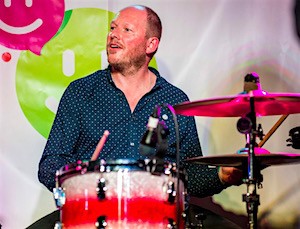 Your main project playing-wise is Archive. You’ve been with the band for 13 years now?
Your main project playing-wise is Archive. You’ve been with the band for 13 years now?
Yes, 13 years. I’ve done 11 albums with them. They’ve been the biggest band of my life. The new album just came out last week, we did a live TV show in Paris and we’re going out on tour in November all over the shop. They’re an amazing band. As a drummer they’ve stretched me left, right and centre. If you’re a music fan you should go back and investigate Archive. Check out what they’ve done sonically, they’re always pushing boundaries. They’re just so different to anything I’ve every been involved in and I’ve learned so much playing with them. It’s a real family now too and I feel very proud being part of it.
How did that gig come about?
It was actually through Robbie’s manager. They were always very good to me and looked after me after I finished the Robbie gig and put me up for other stuff.
Archive decided they wanted to use a different drummer for the third record so my name was put forward. There’s a very famous Archive song called ‘Again’ which is like a 16 minute Pink Floyd kind of thing – that was the first thing I ever did for them and I’m incredibly proud of that recording. That will be my legacy. It just went on from there. I think I’ve recorded about 200 songs for them over the years. And still, even Friday night when we were on TV it was still exciting and ground breaking. I’m really looking forward to starting rehearsals for the tour. I’ve got pre-production this week to figure out what to do. The new album is very heavily drum-machined, so I’ll have to figure out which one I’m taking live. It is a trip hop band but live they like to bring out the real drums which is what brings the live show forward as opposed to the record.
You’ve got a proper ‘trio of drum sound’ working together on this gig, right?
Yes, very much! We have this amazing sound guy called Philippe. I’ve never worked with anyone sonically with such an ear. Then I have a French drum tech called JP who again is so precise in everything he does and we all three work together. This is what I think people should do more because it’s a team. The sound man has to be happy with the sound of the drums so he can create the sound for the whole band. JP knows exactly how to get this sound Philippe is looking for. So I sit there playing in the soundcheck and he’d come over saying: you need to take that snare up.
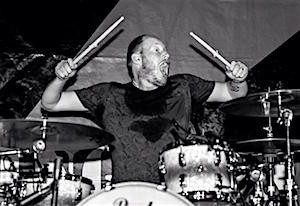 So in the pre production rehearsal we’ll all sit there trying to work it out. This time around we’ll be trying to work out the balance because there are a lot more electronics on this album which I think they want me to replicate. Last night they were on the phone asking if we can get some external pads for example, so I need to get my hands on some. So far we’ve used an SPDSX pad but I think this time I want to get some pads instead. The little squares are actually quite hard to hit on a gig. The number of times I’ve hit the wrong one. You want to hit that specific snare and out comes some cuckoo sound. I’ve done it in an arena. [laughs]
So in the pre production rehearsal we’ll all sit there trying to work it out. This time around we’ll be trying to work out the balance because there are a lot more electronics on this album which I think they want me to replicate. Last night they were on the phone asking if we can get some external pads for example, so I need to get my hands on some. So far we’ve used an SPDSX pad but I think this time I want to get some pads instead. The little squares are actually quite hard to hit on a gig. The number of times I’ve hit the wrong one. You want to hit that specific snare and out comes some cuckoo sound. I’ve done it in an arena. [laughs]
You’ve played for so many artists from all kinds of genres. Is there a favourite style of music for you to play?
Not really, but I would have loved to be in the Wrecking Crew. Someone like Hal Blaine has played for so many people, so many genres and so many hits. I mean being “the drummer with that band” like Ringo or Charlie is fantastic but to have 1000 hits under your belt is just amazing. Sit down with Jim Keltner and asked what songs he’s played on, it’s mindblowing. Mike Dolbear said that when he interviewed Hal Blaine, he didn’t know half of the stuff he’s played on.
If I could come back as anybody, I would come back as Hal Blaine.
Let’s talk about your ‘Sunshine Corner Studio’. Has producing always been a passion of yours?
No, not at all but I started writing with people about 15 years ago and found myself at the frontline of it in the studio, so I learned a little bit then. The more sessions I did rather than just going in playing the drums and leaving, I sat in, watched, learned and studied. I realised producing is actually much more about people than technology. To produce is about getting the best out of another human being, to engineer is getting the sound out of the desk. I think people mistake those two things. Once I worked that out I had a lot more people coming back in here because they liked the way it worked and I managed to get the best out of them – especially drummers. At first I realised some were quite intimidated because I’m a drummer too but after a while I would encourage them or pick out the positives. For example I’d say: That fill into the second chorus is fantastic. They’re instantly happy. Then I would try to say look, you’re kind of overplaying a little bit. Why don’t we focus on that fill? That fill is so important and the other fills around it are kind of taking away from that a little bit, let’s just leave that one in.
The more I did it the better it got. Especially because I was recording and producing my own albums, that was how I started to learn how to do it all because I spent hours in here. I thoroughly enjoy it and I think it’s important to have something besides drumming. You’ll find that most people will teach, do shows, produce, write or whatever. Then when you do go off on a drumming job you enjoy it much more.
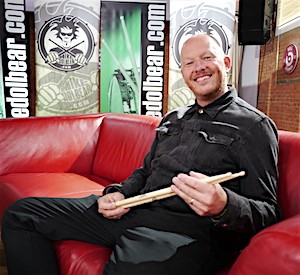 You’re currently working on your fourth ‘Smiley’s Friends’ album. How did that idea come about?
You’re currently working on your fourth ‘Smiley’s Friends’ album. How did that idea come about?
Well, initially I just started writing tunes and needed a way of letting them out and then I suddenly realised that I knew so many great musicians and thought: If you don’t ask, then you don’t get. So I started asking people I played gigs with if they fancied playing on it and they all said yes. That’s where it all went interesting. The more I asked, the more they said yes and the more adventurous I got. It was mainly bass players at first, then I got in some amazing guitarists, the songs got better and I started using a lyricist. The general opinion is that the albums are getting better. For this album now I’ve been trying to push it a bit towards vocals and I’m trying to get 12 singers on it. I’m very excited about it.
And it’s all not about drums, they’re such a small part. It’s all about the songs and I’ve learned so much as a drummer by playing on my own records.
From experiencing both sides of the window, what makes a great session player for you?
First and foremost: feel, groove and playing for the song. It’s the biggest gripe I have with drummers who come here: putting their own stamp on a song. I did it in my 20s – whenever I went in to do a session with somebody I was trying to get my signature sound or fill on it. I realised later on that it’s not about that, it’s about playing for the song. My greatest achievement at the moment is if I do a track for somebody and there is no drum fills in it. The drumming in my album is so far back in the importance. Because I put the drums on later, I just tuck behind the music. Maybe a guitar or the piano will do a fill and I just play straight through it. Less is more! That’s what I’m trying to get out of drummers who come here to record, and they listen. I think I have enough respect that they actually know I’m saying it for a good reason and not just to be pedantic.
Finally, what’s next?
Archive tour coming up in November; then I’m recording an album for Mike Peters from ‘The Alarm’ next week; I’m also doing an album called ‘The Lost Cause’ with Richard Archer from Hard-Fi; and finishing off the Smileys Friends album which is out in January. They’re the things that are keeping me busy at the moment.
Next year Archive are doing all the festivals and then a big tour; the Alarm are going on tour too; The Lost Cause will probably do something as well and I have a few bands coming in the studio to finish things off. Yeah, it’s all very positive.
Thanks for your time Smiley! All the best for the rest of your year.
Tobias Miorin
October2016
To find out more about Smiley’s studio go to www.sunshinecornerstudios.co.uk

